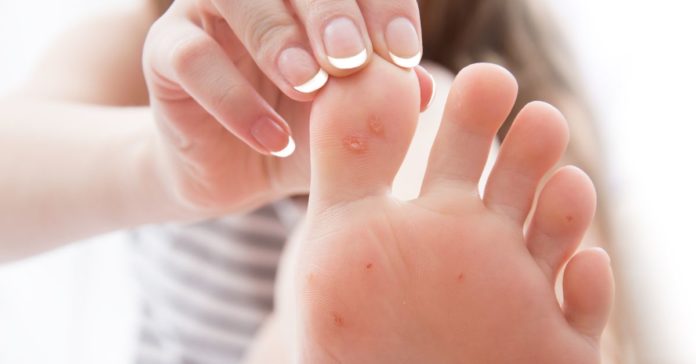Overview
Plantar warts are common among men and women. The majority of plantar warts are not a serious health concern and usually disappear on their own without needing treatment. These warts are usually found at the bottom of your feet. A plantar wart is the symptom of an infection with the human papillomavirus (HPV), specifically types 1, 2, 4, 60, and 63. The human papillomavirus enters your body via cracks in your skin.
About plantar warts
Plantar warts are warts on the skin that look circular and have depression at their center. These warts have a grainy and rough texture. Plantar warts are common and harmless.
HPV is very common with hundreds of strains. However, plantar warts are not easily transmittable. As the virus thrives in moist, warm environments, you could contract the virus by walking barefoot around swimming pools or locker rooms.
What are the signs and symptoms of plantar warts?
Here are some of the most common signs of plantar warts:
- Round fleshy, hard bump with depression in the center present at the bottom of your feetusually at the toe bases or heels
- Formation of callus (thickened rough skin) over a spot where the wart may have grown inward
- Black dots of pinpoint size called wart seeds that are small clotted blood vessels
- Pain or tenderness in feet while walking or standing
When to see a doctor?
If you have multiple plantar warts and some existing health conditions such as high blood sugar,
weak immunity, or an existing condition of warts, get in touch with a healthcare professional to avoid it from spreading. The doctor may recommend a course of treatment depending upon your medical history.
Call 1860-500-1066 to book an appointment
How to prevent plantar warts?
Plantar warts can be prevented by taking some simple measures such as,
- Use footwear in public or shared spaces
- Keeping your feet dry and clean
- Avoiding walking barefoot in the pool areas, locker rooms, and hostels
- Washing your hands and avoiding touching your existing plantar wart
- Keeping your socks and shoes clean
What are the treatment options for plantar warts?
Following are some of the most common treatments of plantar warts. You may need multiple sessions of treatment to completely get rid of plantar warts.
- Peeling medicine with salicylic acid: Wart medications with salicylic acid remove layers of a wart slowly over a period of time. The doctor will ask you to apply these medicines regularly and ask you to visit for a follow-up treatment. The doctor may also shave the surface of the wart and apply trichloroacetic acid with a wooden toothpick. You may have to go back to your doctor’s clinic for repeat treatments every week or so
- Cryotherapy: Cryotherapy is a procedure that involves the application of liquid nitrogen to your wart. This procedure is done at the clinic. You may experience pain, therefore the doctor may numb that area before the procedure. After this, your plantar wart starts to form a blister. Soon, the dead cells fall off the blister. You may need to repeat this procedure and visit doctors’ clinics multiple times until the wart is completely gone for good.
- Laser therapy: Lasers are used when over-the-counter drugs do not work. Doctors use lasers to destroy blood cells that supply blood to the infected tissue. Eventually, it kills the entire wart.
- Surgery: In some cases, surgery is performed to get rid of the wart. This may lead to permanent scars. Your doctor will destroy the wart or cut it away by using an electric needle (electrodesiccation and curettage).
- Immunotherapy or vaccines: In some cases, the doctor may recommend immune therapy to increase your body’s immune response to plantar warts. This method makes use of medicines or solutions to stimulate the immune system to fight viral warts. Your doctor might inject the warts with antigen (a foreign substance) or apply a cream or solution to the warts.
The alternate home remedies for plantar warts
Some popular home remedies that can be used to deal with plantar warts are as below:
- Apply tea tree oil to the affected area. Tea tree oil works in case of infection. You may find good results by applying the oil twice a day.
- Freezing spray: Some people use OTC freezing sprays that act like cryotherapy to stop the growth of plantar warts.
- The use of duct tape is also a popular home remedy that may help warts gradually disappear.
Conclusion:
Plantar warts are common and harmless. Usually, they do not pose any danger to your health.
With proper treatment and preventive measures, you can say goodbye to plantar warts.
Frequently Asked Questions (FAQs):
- What if the plantar wart is left untreated?
An untreated plantar wart may grow up to 1 inch. You may experience pain or discomfort.
- How do I know if I have plantar wart or callus?
Plantar warts usually have small black seeds at the center, while callus has no black pinpoints. Rough textured skin, however, is common to both conditions.
- Do plantar warts go away on their own?
Yes, in many cases, plantar warts need no treatment. They usually go away on their own.


















